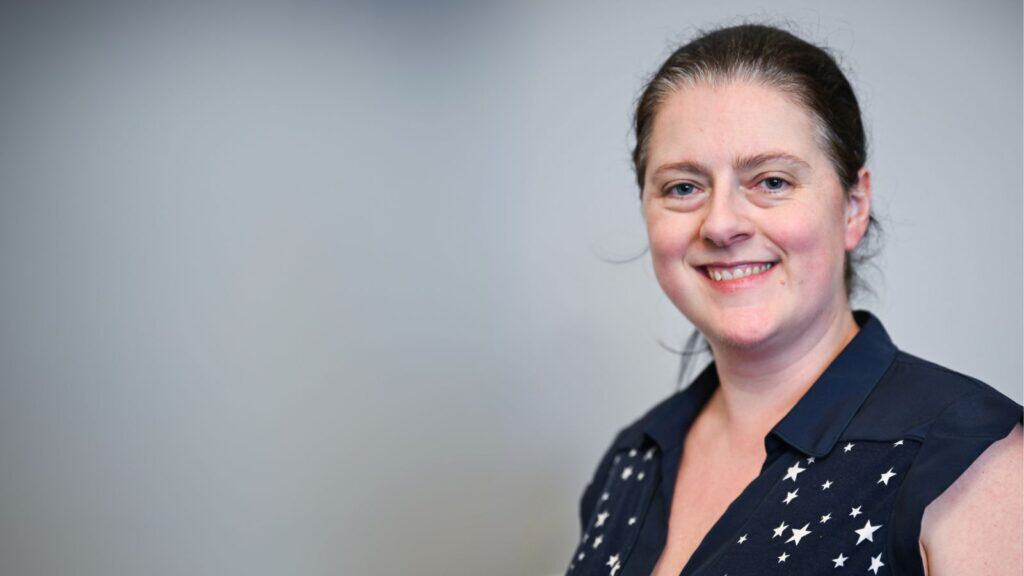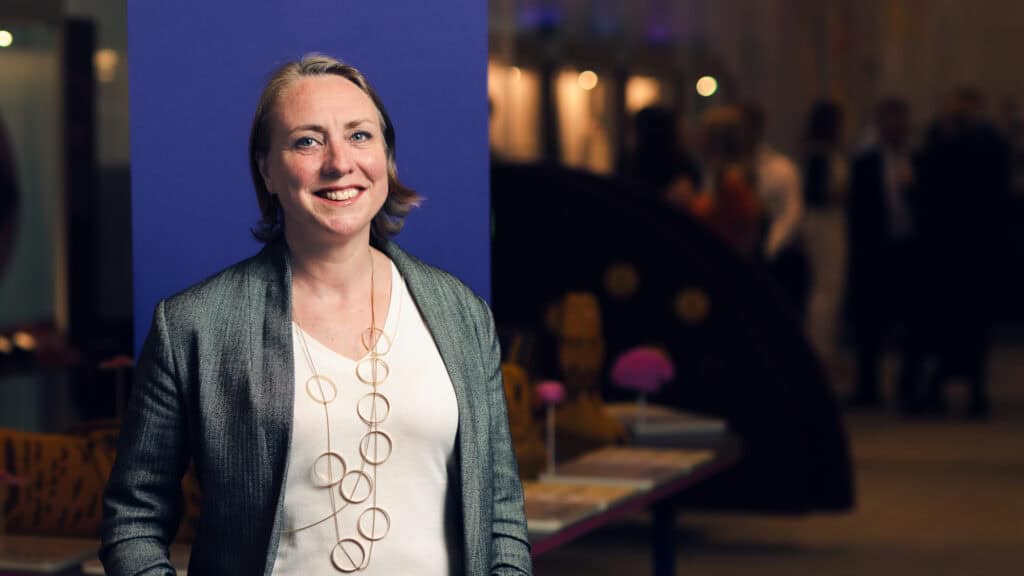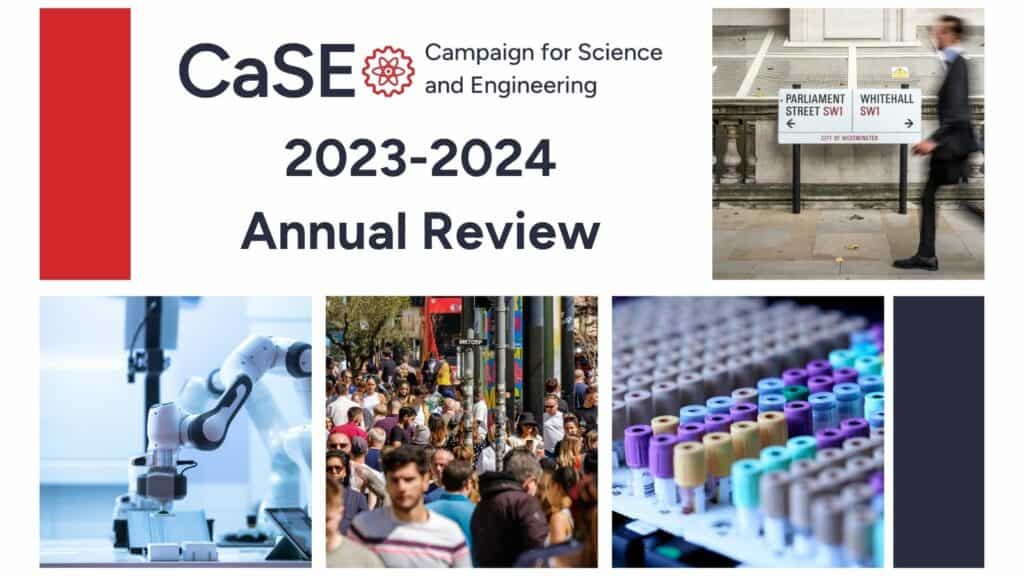Thank you to you all for coming. It’s lovely to see you here today, and a sort of bittersweet moment I think for me, this being my last AGM with CaSE after 10 years, I think it is my 10th AGM.
Executive Director Professor Sarah Main gives her final report on CaSE's activities and successes this year, as well as her reflections on a decade leading CaSE, at the 2023 AGM on 28th November.
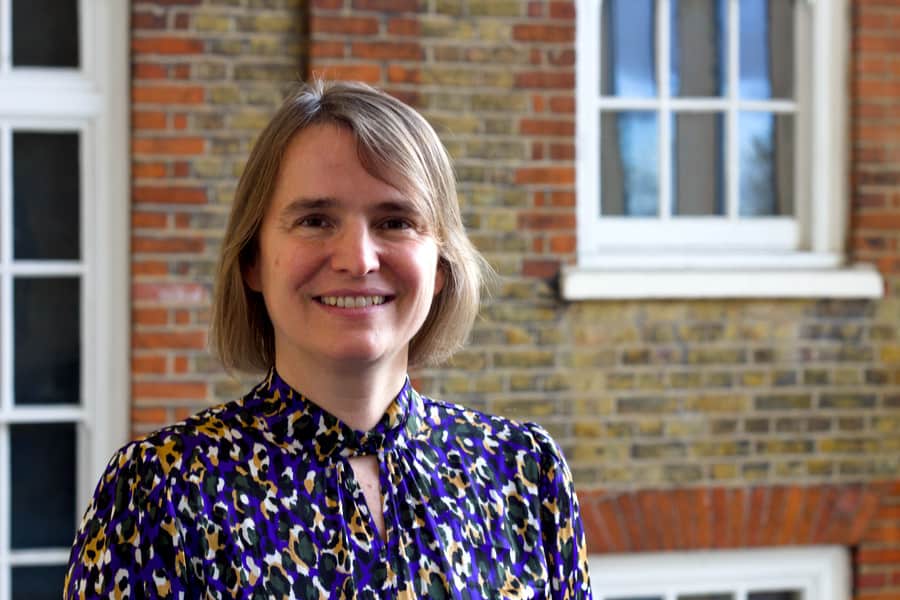
It’s a really appropriate moment that the Annual General Meeting marks the closing of my time at CaSE because I really feel that the members are the heart of CaSE, I think we all know that. But this is what gives CaSE its uniqueness, gives us our independence of thought, and of finance and a voice. I also think it really gives us a credible seat at the table in which we want to be heard. So thank you to all of you, our members.
Now, in the usual way, I’m going to reflect on CaSE’s activities and achievements over the past year, and have a look ahead at what’s coming up, and because it is my last AGM, I will, with the indulgence of the chair, reflect on the 10 years I’ve been at CaSE with a few highlights and thoughts about them.
The Past Year
So just starting on the year that we’ve had. It is often the case that I talk about a huge and astonishing amount of work CaSE has done over the past year, and this year really feels much the same, if not even greater. I’m going to tell you in a few different categories about some things that the CaSE team has been doing.
Thinking about our work, CaSE has published two major programmes. One was called the Skills Opportunity, which was a broad ranging piece of work that looked at the opportunity for R&D, industry and academia in the UK to be strengthened through integrating the skills provision across further education, higher education, lifelong learning, and technical education. It included a number of workshops with members all over the country, a published report, engagement and follow up with the Department of Science, Innovation and Technology on skills and in total, 41 of our members contributed directly to that report. So thank you.
Many of you will have seen and heard the outputs of our discovery decade work this year. It is within this year that we launched the dataset, the findings of the research work, that contributes to the public opinion work at the heart of the Discovery Decade. We launched it on the same day that we held our 2022 annual lecture, which was actually at the beginning of 2023, with Kim Shillinglaw. Some of you might remember the lovely film posters that were displayed at the cinema on Regent Street for that event. Following the launch, the team Rebecca and Ben and all the other colleagues at CaSE, have been working on how to implement and demonstrate how to use the tools and insights that that data has generated. They’ve created guides for users, done extensive engagement across the UK and with many of our members and other stakeholders. They’ve had an emphasis on place and on purpose and have used creative agencies in new ways to do what they call creative sprints, fast moving workshops to think about talking to the public about R&D in particular places around the country, including Belfast, Stevenage, and Manchester, both of those last two just last week.
Those were our planned programmes work, but of course CaSE also has a considerable amount of activity that is responsive, we engage and influence in response to events outside of our design. So over the last year, obviously, there’s been one of those huge programmes of engagement around the negotiations, having left the European Union, on our association with European research programmes, including horizon Europe. I was speaking to a senior political adviser just last week who described CaSE’s engagement through this period as steadfast, and I think that’s about right for us. I think steadfast is what you want to be in a set of complex negotiations and events like that, which really required above all else a kind of perseverance and retaining presence in the dialogue over a very long period of time. We were able to have that kind of steadfast present through lots and lots of dialogue with our members, and Henry, our Director of Sector Engagement will know that we talked about universities and businesses, your views on our association with Europe many, many times in our member meetings across the year.
We’ve been through briefing and engagement with ministers and the Secretary of States, we’ve gathered members views through surveys and data collection, and I think we’ve lent our voice collaboratively with others in the sector who’ve been trying to influence and engage in their own ways as well.
We were also closely involved in an advisory capacity on the development of the alternative pioneer programmes on which I was on an advisory group for the innovation side of it. So across the year, there’s obviously been ongoing engagement with governments, with new departmental officials and ministers and you’ll remember that when the new department was created this year, one of the first things they published was the Science and Technology Framework. We were really pleased that it showed signs of CaSE’s influence and advocacy over a long period of time, there was evidence of our recommendations from many, many CaSE reports, including our ones on R&D investment on skills, on public sector research establishments, and on R&D in place.
During this year, the ongoing discussions have been on the position of the UK Government on immigration and migration with regard to skilled work and visa rules that affect scientists and engineers from abroad who wants to study visit and work in the UK. We have a long track record of activity in that area, and we’ve continued to advocate to try and attract people who are going to enhance the science and engineering workforce in UK, rather than to put them off through the visa programme.
As well as that kind of regular ongoing work. There are moments where a high degree of rapid responsiveness is needed, and CaSE has its moments of spotlight, often in the media. There were two prominent moments for that in the year. One was, the moment at which it was became clear that just over one and a half billion pounds of money that had been earmarked for R&D had been surrendered to the Treasury. Working with Andy Hawkes, our Communications Manager, we really were able to put up a rapid response to that, and I think in that environment send a clear message of accountability to political leaders who had made parliamentary statements that the money set aside for Horizon would be spent on R&D. I think through making that clear assertion of accountability, we have sharpened the focus this year on decisions being made in Treasury right now about how the money was allocated at the autumn statement, which we had just a week ago. I was really pleased to see then that there did seem to be much more expansive creative thinking about how to use that money to support UK R&D.
The other moment, which really was a joy this year was the moment at which our association to Horizon Europe was announced. You know, you don’t believe it until you really, really hear it, but the moment I heard it, I really was very, very pleased and delighted. I was hearing it from a very, very reliable source, so it was a real joy to be able to give a unequivocal hurray to that moment, after many years and a lot of work by many in the sector, including CaSE. I think we were able to have immediate presence in voicing why that association mattered so much to our members in industry, academia, and charities.
Inside CaSE
Moving on to CaSE as an internal organisation over the last year. I’m really pleased that CaSE has grown and embedded itself as a full capacity team. The CaSE team is fairly small, as you know, we still haven’t hit double digits yet, we’re about eight, but half of that team have been with us for less than two years. It is really still quite a young team in terms of our work together, but it’s one that has gelled really very well. It’s a productive and innovative team, and I wanted to share with you that we have been going through a process of thinking about how CaSE can be even better, which we started as a conversation a year or so ago. A conversation about what would it look like for CaSE to really fly, for it to reach greater heights. We have a shorthand for this, our good to great programme.
Through that programme, we have worked quite extensively on a few different areas of our internal practice. One is on our working practices. We’ve done consultation and review of our policies internally, and I’m very proud that the organisation is one that has an energy to work together to really try and be first in class, to be innovative in the way that we embed our working practices in the organisation. I think that stood us in really good stead for the cohesion of the team, I hope it continues.
We looked at two other main areas in this programme. One was about really reaching new people, packaging the analysis that we do in new ways so that it’s useful to new audiences, thinking about our data functionality and digital presence. The third area was articulating the value of CaSE trying to be assertive and bold in how we express the value of the organisation.
Alongside all of that, and integrated into it was the launch of new website, new colours and branding that you might see what you can see in the slide, the holding slide just behind us.
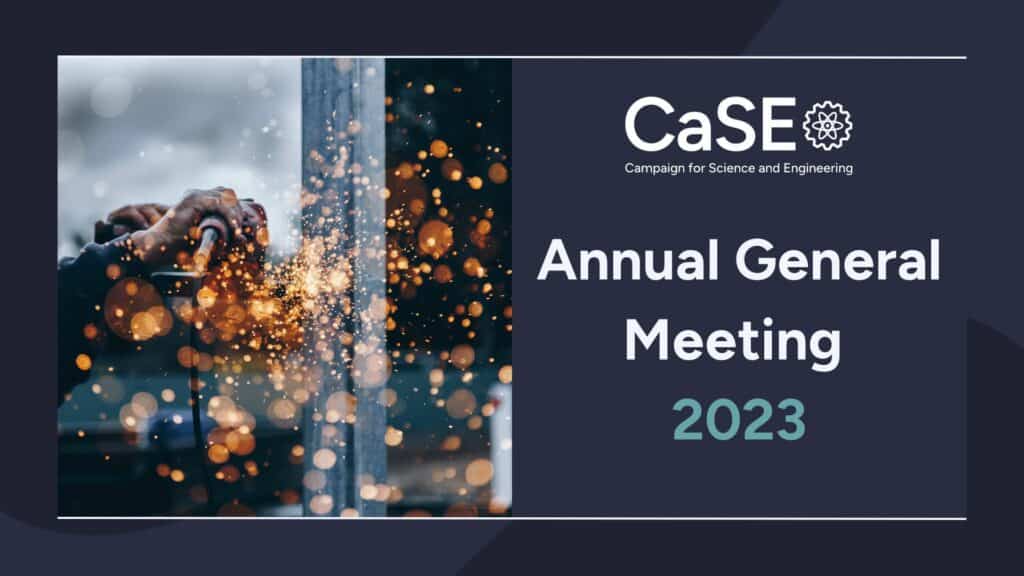
A huge amount of work went into that across the whole team. It’s been a bumper year of media appearances, our media appearances have trebled this year compared to the previous and they’ve included TV, radio, editorials, and many, many quotes.
Finally, the team have really added up their miles of travel and have been out and about across the country visiting members and hosting workshops, and speaking at many events. I think that activity has really proliferated through all of our team members so that the whole team is now really actively moving about the UK and working with others across the country. This year, for example, the team has been in Glasgow, Birmingham, Nottingham, Loughborough, and Cambridge, to name a few. Also, for the first time in many years, we had a presence at all three party conferences, in Manchester, Liverpool, and Bournemouth. In total, we had over 100 meetings with members over the course of year.
The Year Ahead
Looking to the year ahead. We have exciting plans, with our board, to move in the medium term to a future where CaSE can integrate its public opinion work, at the moment held under the Discovery Decade banner, into CaSEs core work. I think that’s a really exciting proposition that will enable us to weave together our policy expertise and public opinion insights so that they can inform and support each other. We have plans to create a transition phase from the grant that has funded the Discovery Decade work to enable it to be core funded activity. Henry, our Director of Sector Engagement is leading on that, creating a coalition of funders to support that transition and to engage with our members on the value of that enhanced offering, so that we can get to a model, ultimately, with fully funded support for this through our core membership.
The General Election, which we assume will come in the next year, provides a perfect opportunity to demonstrate the value that integrating those functions could bring. We have the opportunity to act as a convener, we have a General Election hub on our website, and a forum of stakeholders where we are sharing and honing messages. We have space in the General Election period, to experiment with this idea of blending policy and public opinion so that they can inform and enhance each other and reach and resonate with greater and more diverse audiences. We also have creative work from agencies that will provide new opportunities for ways to create coherence in the sectors messaging, in language or in imagery to create an identity for messages around the value of R&D.
In addition to the General Election, we have programmes of work planned as usual, we have a new programme that’s underway on the environment for business R&D. It’s going to explore what’s needed in the UK for businesses to thrive, which are led by R&D. That will include not only the qualitative work that we do through our workshops and consultations, but also new economic analysis, and I’m sure the results of that will inform the Spending Review and economic decisions that come after the election.
In addition to that, we have a number of other new programmes just getting started under the banner of the public opinion work of the Discovery Decade. Rebecca is leading a public dialogue exercise to explore society’s stake in UK research, and we have a new programme of work in collaboration with the Bill and Melinda Gates Foundation, exploring public opinion on R&D related to global goods and international development.
I want to make sure to thank, very clearly, all the members of the CaSE team for their efforts in the work of the year to date and in the year ahead. All of this work is their work, and they really bring such energy and innovation to the team, I’m astounded by them every day, thank you to all of you.
There is so much exciting work emerging from CaSE of real value to the sector, for all of us in science and engineering, that I really don’t know why anyone would ever consider leaving. So at this point, given that I am going to about to make that journey, I will just switch and look back over the last 10 years.
A Look Back Over 10 Years
I wanted to reflect a little on 10 years, but of course CaSE has been around longer than that, so we need to acknowledge that CaSE has been around for nearly 40 years. I’m hoping I’m going to get an invitation to the party when he does hit 40, which will be in 2026, but I’m going to spend some time just looking back at that last 10.
I’ve only got two slides, this is really the most important thing I want to say about my reflections on these 10 years. The people who have worked at CaSE are really the theme of what I have to say, any words of acknowledgments about CaSE’s achievement are a credit to all of these people. Many of you might remember some of these people. They’re roughly in chronological order.
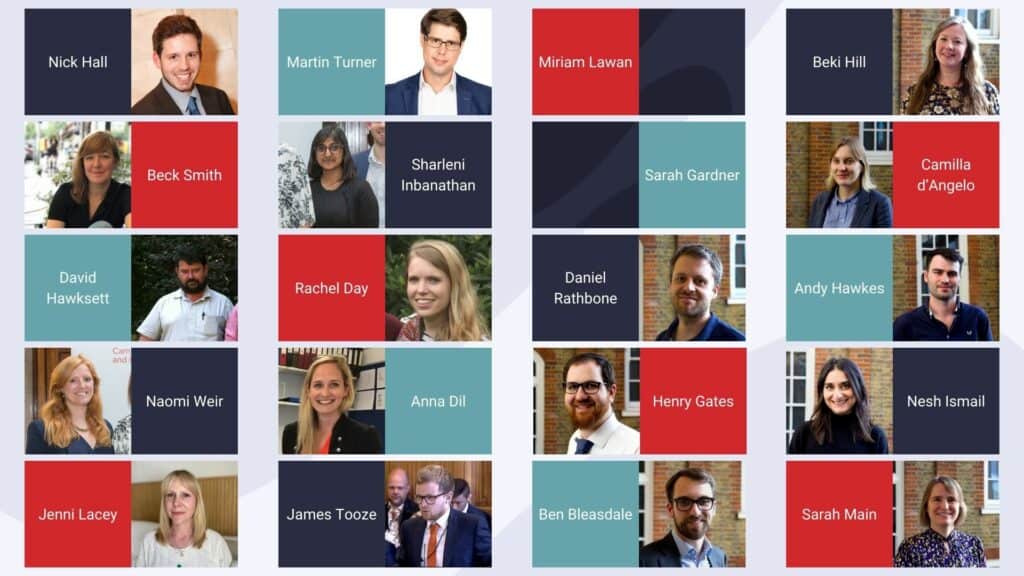
So starting from the top left as the team as it was originally when I arrived, Nick and Beck and Dave. People have come and gone over the years as you can see, and we’ve ended up on the right hand side largely with the current team as it is now, from Daniel in the middle column and to the end of the right hand column. There are two with no photos, I remember them being a little camera shy, but they were all highly valued parts of the team.
Really, I want to say thank you to every one of these people who has created the work of CaSE over the last 10 years, there are these people plus our interns and fellows who have contributed to us as well. You’ll notice that it’s not a huge number, there are only 20 people on that slide. Everything that I will tell you and reflect on about CaSE that has been achieved by these people. I feel I am a part of that team, but the credit goes to them.
I’m particularly proud that all of these people that have been a part of CaSE have brought with them a culture of entrepreneurship. I feel CaSE has been at its best when people can follow their passions and their strengths and their motivations. These people have consistently given their energy and commitment to CaSE.
Next I’m going to thank the board of CaSE. I’ve highlighted here our three chairs over the last 10 years. Hugh Griffiths who was the first chair I worked with, Graeme Reid, and Bob Sorrell our current chair.
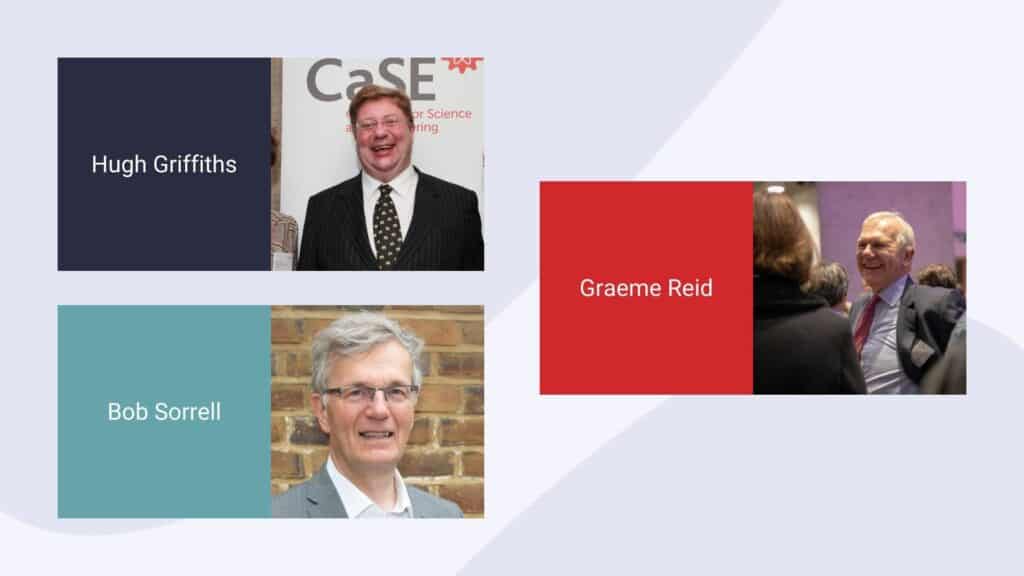
I feel so fortunate to have worked with all three of them, and I have learned an enormous amount from them. I hope that if I ever chair anything, at any point, I’ll be able to reflect how well they have chaired CaSE. I really feel that the board of the CaSE is a hidden asset. Not many people see the board of CaSE and not many people know who our trustees are, but the board has really guided and supported CaSE over my last 10 years. I would really like to thank every one of the trustees that we’ve had, over those 10 years, probably too many for me to fit onto their own slide.
However, it really is worth acknowledging that these are people who have volunteered their time to help make CaSE a great organisation and for it to be valuable and of service in the scientific community. The board is terrific and has been terrific for 10 years. I wanted to acknowledge Graeme in particular for his work in strengthening the board and strengthening our governance. When he arrived I think he bought his civil servant’s eye for process. I was fairly fresh out of the Medical Research Council and had done one or two things in governance and I think we together really strengthened the governance of CaSE and that has really set it in good stead. So thank you from me to every one of our trustees and to our three chairs.
10 years ago
When I was thinking back 10 years a memory that I wanted to share with you is of an April fools from 2014.
I was in my first year as Executive Director of CaSE, David Willetts was at the time the science minister, and Research Fortnight ran a front page article as their April Fool’s. The announcement in the article was that David Willetts had announced that the 11th great technology, after his eight great technologies, was due to be teleportation.
He was going to invest £60 million of government money to commercialise this interesting research. The article went on to give enthusiastic quotes from the minister and an enthusiastic quote from a subject expert, from the Montgomery Scott Institute in Perth, who said:
“Imagine a world—indeed solar system—where you simply stepped into a British-made teleport and most of you rematerialised at your destination, or somewhere not too far from it.”.
It’s a lovely article. All of this enthusiasm was then followed by a mention of CaSE; “The Campaign for Science and Engineering was less enthusiastic. “While any new money for science and technology is welcome, this fails to reverse the erosion of the core science budget that has left the UK struggling to compete on the world stage,” said a CaSE spokeswoman.”
Well I couldn’t have written it better myself. This is exactly what CaSE was doing for the first few years of my job as Executive Director. We were calculating the real terms reduction in the science budget following the 2007 market crash and the Government period of austerity and budget cuts that started around 2010 onwards. Indeed, my first induction into CaSE was to be introduced to the spreadsheet which calculated this number, and someone had to explain to me what GDP de-valuers were.
That was CaSE at that time, talking about erosion of budgets and about the competitiveness of the UK on the world stage. I think we have moved on from there. That quote isn’t like the quote I would give today, I hope at very least we might be more enthusiastic about teleportation.
It’s lovely, just to think of a few highlights of CaSE from that time. Starting with that April Fool, that was really a piece of economic commentary and CaSE has a long standing track record on thinking about and analysing and challenging the relationship between science and engineering activity and economic growth and prosperity, going back to the start of Save British Science in 1986.
In my time at CaSE, the first really substantial piece of economic work we did was the Hughes and Haskel paper, The Economic Significance of the UK Science Base. That paper dealt with a wide range of things, but one of the some more prominent findings that has been shared ever since was its finding on total factor productivity growth. That is that scientific research returns value to the economy in perpetuity, of approximately 20 pence to the pound.
That piece of work was commissioned and paid for by a coalition of 6 CaSE members. It was a wonderful piece of work by two great economists, and I think CaSE did a very good job of integrating and delivering the findings of quite a dense economic paper into mainstream policy thinking and fiscal rationale. At one point, several years later, we tried to actually count the number of times that paper had been referenced and it was an awful lot. It had really got to a place where it was regularly referenced in the government’s own reasoning, and rationales for their fiscal decisions on R&D. It was mentioned at Autumn Statements by the Chancellor, in government papers, and in departmental economic reviews.
CaSEs work on science and economies isn’t limited only to that paper. That paper was published in 2014, in 2015, there was a General Election and CaSE did three substantial briefings, one of which was on investment. That was the first time that CaSE as an organisation made an argument to go from the flat cash budget where we were, to a rising investment in R&D. We created a graph of a 10 year growth plan, so that the UK could reach the level of R&D investment of its peers in the OECD in Germany and the USA, and Graeme will remember it because he sketched out what he thought it might look like, but it was a 10 year growth plan that we were proposing and a rationale for why that would be valuable.
A number of years later, in 2019, in our report Building Scientific Strength, we published the first model for how to reach the government’s target of reaching 2.4% and then 3% of GDP invested in R&D. I think CaSE has really invested in and built on its capability for analysing deeply, and sharing and communicating these kinds of fiscal strategies to boost R&D investment. This has continued, and I think expanded under CaSE with us thinking about the role of economic prosperity stimulated by R&D in place and in conversations about levelling up, and so on.
Back in 2014, when that Hughes and Haskel paper was published, almost at the same time, I think, in the same month, we published a paper on diversity in STEM. That was a substantial piece of work that looked at dimensions of diversity, including gender, ethnicity, disability, and socio economic background. It was a piece of work, which was contributed to by all of you, our members, and collaborators across the sector, and it pulled together all of the efforts and thinking of many, many organisations. That has continued as a theme for CaSE and we have reviewed progress with improving diversity in STEM over the years.
We’ve done other really important work in the realm of people and skills within science and engineering. The immigration work I mentioned has been a feature this year, but over these 10 years, around about 2017/2018, we really did a huge amount of work on visa rules that were being changed for people to come to the UK from outside of the European Union. At that time. They were being limited due to a policy of restricting numbers coming into the UK. Importantly, that is an example where we not only ran the campaign, but we made the policy change. We helped to bring about material change, to policy and to people’s ability to arrive in the UK to do science and engineering jobs. I think for me, it has been important that CaSE isn’t only an organisation that gathers evidence and conveys evidence and talks about it, but also takes the additional steps to work towards working with policy makers and thinkers to create practical feasible material change. The final thing I mentioned is that education and skills area where I mentioned the Skills Opportunity report we’ve done this year, that builds on previous work looking at education, such as our Inspiring Innovation report.
There have been some other highlights in the way in which science is used government, and of course, that’s much in the news at the moment with the news of the COVID inquiry. We were delighted to host Angela McLean just last week for our 2023 Annual Lecture.
For me, another highlight of the last 10 years was the structural issue to do with science advice to government, which was the anti-lobbying clause in 2016. That’s something that came out of nowhere, we weren’t planning for it or preparing for it, but it was an idea that came through the cabinet office and was really announced and implemented with no further ado until people, such as CaSE and others, started making clear that it had wide ranging damaging implications for the ability of anyone funded by government research to use the findings of their research to inform or influence government or parliament. It was a long year that year, but we got to a good outcome with the Cabinet Office in the end.
The EU referendum and Brexit have been a constant through my entire 10 years at CaSE. I think CaSE was very well positioned at the beginning of that time, because we had done quite a lot of consultation with our members on the value of European Union membership to UK science and engineering. We’d written a report on it, so when the referendum was announced, we were able to share survey findings about the views of scientists and researchers about the value of European Union membership and the reasons why quite quickly, showing at that point 93% of people we surveyed supported European Union membership.
Those have been some highlights for me. I think I’ve mentioned it already, but the new way that CaSE is starting to engage with and explore public opinion and integrating that into our work has been a real highlight and something I certainly felt some trepidation about getting into that area when we did at the beginning, but it has really delivered and delivered more and more interesting insights and I think great potential for the future.
Alongside those highlights, I think it’s worth mentioning that that ongoing work of CaSE is vital even when it’s not in the news and when those highlight moments are not happening. So the regular business of budgets, Autumn Statements, spending reviews, General Elections, devolved and local elections, the referenda on Scotland and Europe. CaSE has a role to play in all of these convening the views of our members and championing the positions that are most important to them. In order to do this it is so important that we maintain our relationships and the trust that is held in CaSE. It is presence and perseverance that matters along with the robustness of evidence and independence of analysis. These things have built up trust in CaSE over many years, and it is these principles we must strive to carry with us.
If there’s one truism my time has left me with, it is that political turmoil is not new. It happens every year. You know, I could say at any AGM over the last five years, what a year we’ve had in terms of political turmoil. I mean, some were more exciting than others, I don’t know if you remember the year when we got up to 5 or 10 different MPs walked across the floor of the House, changing parties, a new party and all sorts. But, there is nothing new in political turmoil, and CaSE has been dealing with political volatility for a long time, and we will be needed to be a voice throughout change to come. We are an organisation that just has to live with and cope with change and we need to be there steadfast as ever. I think our core principles about evidence, about independence, and being nonpartisan are vitally important, and ultimately, our perseverance.
Are there areas that still need work? I mean, yes, of course, there are. I don’t need to tell you, we all know where many in this sector have tried very hard and still some problems are quite difficult to make progress with. I mean, I only have to talk to my 13 year old daughter about her subject choices to know that. Without any doubt, in my mind, there’s still a bit of an image problem for science.
I think there is real potential in the ways that we can discover and talk to people more meaningfully about the value of science, research and innovation to them in their lives, and how we can focus on the value and benefit that it brings. I think that that will not only help us with engaging the public, it will help us engage politicians and policymakers and help us achieve our policy ends. So we need the partnerships and collaboration that I think CaSE has really built over these last 10 years. CaSE doesn’t act alone, it is a collective voice, but it acts with the stakeholders across the community to bring real coherence to the sector.
My final thought is that on leaving CaSE, I will definitely be signing up for the CaSE newsletter. I can’t really imagine doing a new job without having CaSE’s insights. So I think CaSE is still needed. It is in great shape. I’m delighted that Daniel Rathbone, who is our Deputy Director will become our Interim Executive Director. CaSE has an exciting future.
I think we all need to keep supporting the cohesiveness of the sector so that we do have a strong and solid voice. I think it’s the right thing to do and I hope we will all still help put science and engineering at the heart of the UK’s future.
